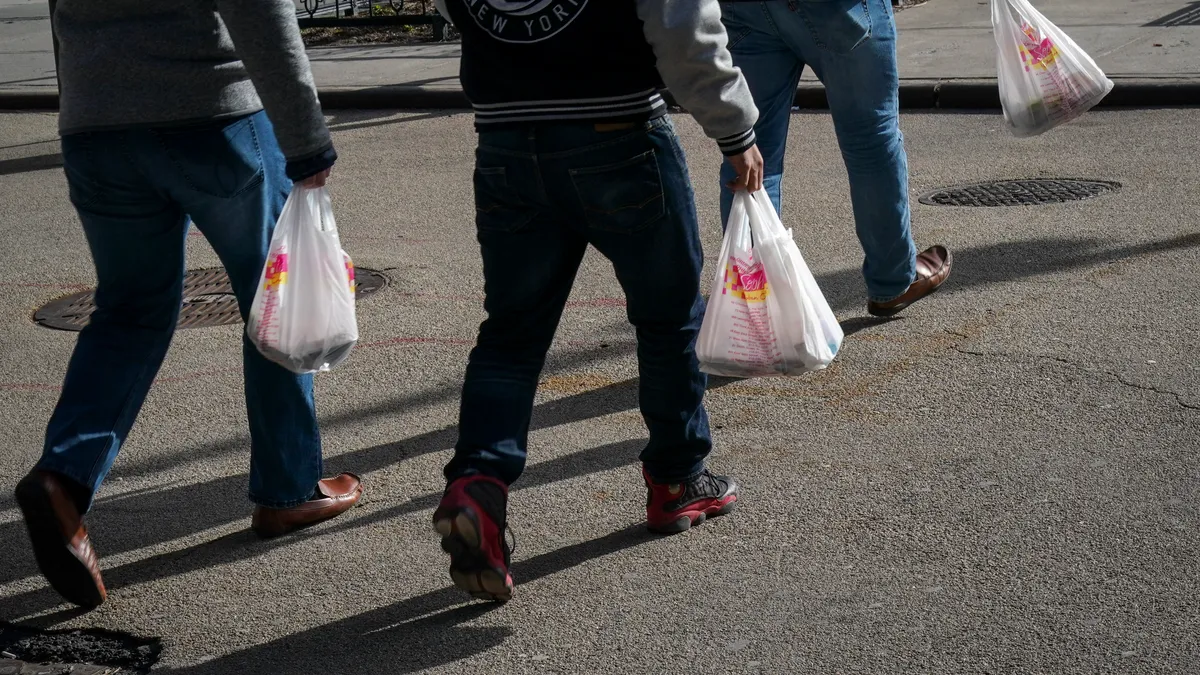Dive Brief:
- Have plastic bag bans helped or harmed the environment? Recently released studies — backed by environmental research nonprofits and a group representing plastic bag manufacturers and recyclers, respectively — differ in their findings about the impact of the bans and the uptake of reusable bags that has resulted.
- A study released Thursday reviewed statewide plastic bag bans in New Jersey and Vermont, and local ones in Philadelphia, Portland, Oregon, and Santa Barbara, California. The report, from U.S. Public Interest Research Group’s Education Fund, Environment America Research and Policy Center and Frontier Group, showed evidence in those jurisdictions and elsewhere that such policies reduce plastic waste and pollution and encourage reusable bag adoption.
- In contrast, a study of New Jersey’s ban on single-use bags, released last week by Freedonia Group, backed by the American Recyclable Plastic Bag Alliance, suggests the ban has negative environmental impact when considering the production footprint and lifecycle of alternative bags.
Dive Insight:
In 2024, Colorado and Rhode Island brought the list of U.S. states with plastic bag bans in effect to 12, adding to California, Connecticut, Delaware, Hawai’i, Maine, New Jersey, New York, Oregon, Vermont and Washington. More than 500 cities and towns across 28 states had a plastic bag ordinance in effect as of 2021, according to Environment America and partners. Some U.S. retailers have also voluntarily stopped offering plastic shopping bags — Aldi this year became one of them.
Plastic bag bans are an important and growing policy to consider, the PIRG report details. Single-use plastic bags commonly end up in landfills or, worse, as litter. Recycling infrastructure for single-use plastic bags is limited, and they’re often improperly recycled.
The report highlights 2007 when San Francisco passed the nation’s first plastic bag ban, beginning the bag ban era in the United States. Although some bans were suspended in the early days of the coronavirus pandemic, the report states that “the plastic bag ban movement has reached new heights in the last few years,” with the number of state bans multiplying.
The report assesses policy efficacy in jurisdictions with bag bans through metrics like estimated bags saved per person and change in plastic bag disposal rate. It also examines local litter data.
The authors call for more bans on single-use plastic bags and also call on policymakers to “close loopholes that weaken or counteract the effectiveness of existing bans.” For example, in some cases where thin plastic bags have been banned, thicker plastic bags that are technically reusable have been offered for a fee. But often these bags are still discarded after a single use, the report states.
The report also found that in jurisdictions where recyclable single-use paper bags are still allowed, consumers are still generating waste. The report shared the example that following Portland, Oregon’s bag ban, which did not have an associated paper bag fee, paper bag use shot up 500% prior to the local ordinance being superseded by a statewide ban with paper bag fee in 2020.
Ultimately, the report recommends that policies be written to not allow plastic film bags of any thickness at checkout; that stores charge a fee on single-use paper bags to discourage consumption; and that governments conduct regular enforcement.
The PIRG report notes that in New Jersey, the ban on plastic bags at grocery stores that took effect in May 2022 also restricts thicker plastic bags and prohibits paper bags at larger retailers. The report highlights that between beach sweep cleanups in spring and fall 2022, there were 46% fewer single-use plastic bags collected in the latter.
The Freedonia study of the New Jersey ban included insights from interviews with retailers and plastic bag suppliers and distributors, including ADCO Packaging and ALEF Standard Packaging. It's backed by the American Recyclable Plastic Bag Alliance, which rebranded from the American Progressive Bag Alliance in 2020 with Matt Seaholm as executive director. Seaholm is now CEO of the Plastics Industry Association.
The study found the ban resulted in “a complete overhaul” of the plastic retail bag market and has led to more reusable bag adoption. But although total bag volumes fell by more than 60% by 2022, the PP used to produce nonwoven or woven PP bags, with a larger carbon footprint, increased at least sixfold. The study states that reusable bags are typically used about two or three times before being discarded, “which falls significantly below the recommended reuse rates necessary to mitigate the greenhouse gas emissions generated during production and address climate change.”















